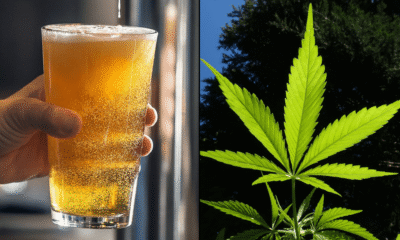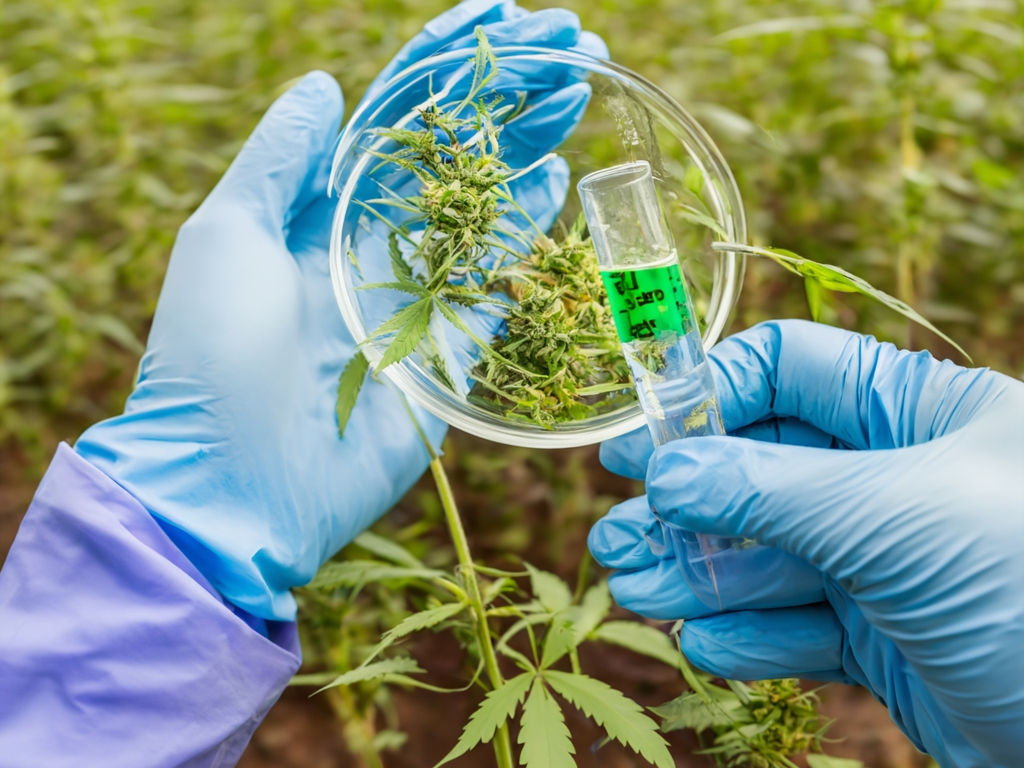Science + Technology
Treating Grief + Medical Cannabis
Published
1 year agoon

Grief is a multifaceted emotional response to loss, manifesting uniquely in each individual and often unpredictably over time. Its symptoms can range widely, from profound sadness and withdrawal to confusion, anger, and physical symptoms, including fatigue and changes in appetite. Grief challenges the conventional understanding of a linear healing process. It can resurface during anniversaries or through seemingly unrelated events.
UNDERSTANDING GRIEF
Grief is a normal and natural emotional reaction to loss or change of any kind. It can occur when a loved one is lost, a relationship ends, or a familiar pattern of behavior changes, like a job change.
Symptoms may present themselves physically, socially, mentally, emotionally, or spiritually. Some of the most common symptoms of grief include:
- Guilt
- PTSD
- Fatigue
- Anxiety
- Insomnia
- Depression
- Headaches
- Loss of appetite
- Aches and pains
- Isolation from friends and family
Understanding Grief
A popular notion of “the five stages of grief” (shock, denial, anger, bargaining, and acceptance) suggests a linear progression. This isn’t entirely accurate; the grieving process is highly individualized, with each person experiencing a unique mix of emotions without necessarily going through set stages. Grief presents more like a tumbleweed without any rhyme or reason when the expected and unexpected symptoms appear.
“As for our losses and gains, we have seen how often they are Inextricably mixed. There is plenty we have to give up in order to grow. We cannot deeply love anything without becoming vulnerable to loss. and we cannot become separate people, responsible people, connected people, reflective people without losing and leaving and letting go.”
The Role of Cannabis in Managing Grief
The endocannabinoid system (ECS) regulates various bodily systems that impact mood, sleep, appetite, and memory, among other physiological processes. Cannabinoids, the active compounds found in cannabis, interact with this system by binding to cannabinoid receptors located throughout the body (CB1 and CB2 receptors). This interaction triggers the ECS, influencing a range of physiological responses—from managing pain and controlling nausea to modulating emotions such as joy and anxiety. When cannabis is consumed, these cannabinoids, i.e., THC (delta-9-tetrahydrocannabinol), activate these receptors, thereby affecting how we feel both physically and emotionally. Cannabis can be most effective when used during the grieving process, allowing personal reflection, easing social interactions as needed, and treating physical symptoms like insomnia and loss of appetite.
Several of the grief symptoms listed above are qualifying conditions in most states with a medical cannabis program. It’s important to note that while cannabis may offer relief during mourning, it is not suitable for everyone and should be considered as one of many tools for coping with a trained and state-registered cannabis clinician.
Guidelines for Using Cannabis to Cope with Grief
- Seek clinical treatment with a trained cannabis clinician. Oftentimes, a conventional healthcare provider may prescribe a pharmaceutical product that may be impacted by the body’s processing of plant-based drugs with synthetically produced drugs.
- Start low. Go slow. This is always true with cannabinoid therapeutics. Begin with a low dosage to gauge the effect, adjusting as necessary to avoid discomfort.
- Experiment with different cultivars (strains) with unique blends of cannabinoids and terpenes. Also, explore different consumption methods—smoking, vaping, or edibles—to find what best suits your individual needs.
Conclusion
While cannabis can aid in alleviating the distressing symptoms of grief, it should be approached as part of a broader strategy that includes professional guidance and supportive care. Grief is a deeply personal experience, and managing it requires a respectful acknowledgment of both the pain and the process.
Jacquie Cohen Roth, MS, is the Founder/CEO of CannabizMD. CannabizMD is hosting the webinar on Zoom, “Treating Grief + Medical Cannabis,” on Tuesday, May 21, from 1 pm – 2 pm EST. During this webinar, medical cannabis clinical experts will explore how specific cannabinoids and terpenes can target symptoms such as anxiety, intrusive thoughts, and PTSD, offering a holistic approach to healing. Our expert panel will discuss evidence-based strategies, dosage considerations, and the integration of cannabis into comprehensive grief support programs. Tickets are $30, with proceeds to be donated to three nonprofits. Ticket link on CannabizMD and Eventbrite.

Author: mscannabiz.com
MScannaBIZ for all you Mississippi Cannabis News and Information.
You may like
-


The Cannabist Co. Divests Dispensary Footprint in Pennsylvania
-


A Fresh Start: Vicksburg Nutrition brings health, flavor, and heart to the community
-


New York State Faces Lawsuit After Cannabis Regulators Admit Measuring Mistake
-


New Mississippi vape law takes effect in October, only FDA-authorized products allowed
-


More Young Adults Are Opting For Cannabis Drinks Over Alcohol At After-Work Happy Hours, Poll Shows
-


How AI Is Changing The Cannabis Industry
Science + Technology
Opinion: Beyond the Colony Count: Cannabis Testing Must Evolve
Published
7 months agoon
January 28, 2025
Let’s be blunt: the cannabis industry has a dirty little secret. While we celebrate legalization and a booming market, our testing standards lag dangerously behind. We’re fixated on quantifying total microbial counts, like obsessive-compulsive gardeners counting blades of grass, while overlooking the real threat—pathogenic bacteria that can turn a relaxing toke into a medical emergency. This needs to change. We must shift our focus from broad microbial assessments to targeted pathogen detection to protect public health.
Currently, most cannabis testing regulations emphasize quantifying total aerobic bacteria, total yeast and mold counts, and other microbial colonies. The current testing standards rely on antiquated microbial plating methods, which require time-consuming incubation periods and inaccurate counting methodologies, typically by hand. This approach is like judging a party by the sheer number of attendees, not whether anyone is harboring a contagious illness. Sure, a crowded party might be overwhelming, but the guest with the hacking cough poses a real risk. Similarly, in cannabis, it’s the presence of specific pathogens like Aspergillus fumigatus or a Salmonella species that can cause serious harm. And let’s be honest; nobody wants a side of salmonella with their Sour Diesel. This discrepancy is glaring when compared to the food industry. Imagine if cheese and fruit were tested only for total bacteria, without regard for specific pathogens like Listeria monocytogenes! For good reason, the FDA has stringent standards for detecting specific pathogens in our food supply. Why should cannabis be any different? The science is clear: we need a more targeted approach. For a deeper understanding of the regulatory discrepancies and scientific rationale behind this argument, I encourage you to explore the work of Dr. Sherman Hom, PhD and his colleagues at Medicinal Genomics.
Let’s be blunt: the cannabis industry has a dirty little secret. While we celebrate legalization and a booming market, our testing standards lag dangerously behind.
– Ben Sigman, MS, MBA Candidate at Johns Hopkins Carey Business School
The solution lies in adopting more advanced technologies. PCR, or polymerase chain reaction, offers a precise method for identifying specific pathogens. Compared to traditional plating, PCR is more efficient, accurate, and reliable. PCR allows us to detect pathogens in a small sample based on the presence of their specific DNA code. PCR testing allows us to pinpoint the culprits and ensure consumer safety. By embracing PCR-based testing, we can move beyond crude microbial assessments and prioritize public health. Some real-world applications of PCR include:
- COVID-19 testing
- Paternity testing
- Forensic DNA analysis at crime scenes
- Genetic testing for diseases
- Research in molecular biology
The consequences of inadequate testing are significant. As highlighted by Dr Hom, the industry needs to focus on clinically relevant studies behind contaminated cannabis. Cannabis requires species-specific human pathogen testing; it is essential to understand which microbes contain clinical value to focus on. Contaminated cannabis can lead to severe health issues, particularly for immunocompromised individuals. It’s a risk we cannot afford to ignore. Please refer to the Clinical Microbiology and Infection article Too Many Mouldy Joints – Marijuana and Chronic Pulmonary Aspergillosis. This article details cases of invasive pulmonary aspergillosis in cannabis users, which is a serious condition that can lead to severe respiratory issues and even death (Gargani et al., 2011). Additionally, the CDC published a study indicating that cannabis users are 3.5 times more likely to acquire a fungal infection.
As Jini Glaros, MS, former Chief Science Officer at Modern Canna Labs and owner of CannaCAS, aptly points out, “The biggest misconception is that any microbial testing is adequate. Standard plate counts are ineffective for certain fungi and cannot enumerate all microbes present. We must move beyond this outdated method and embrace more advanced techniques like PCR.”
The issue isn’t solely a lack of understanding about the dangers of pathogens. It’s more nuanced than that. According to Glaros, the challenge lies in the legislative framework and the complexities of changing regulations. Think of it like this: we’re trying to steer a giant ship (the cannabis industry) in a new direction, but the steering wheel is a bit rusty, and the crew isn’t quite sure which way to turn. It takes time, effort, and coordination to make those changes. However, there’s hope. Over the last few years, we’ve seen a steady shift as more states adopt cannabis-specific pathogen testing standards.
Dr. Hom emphasizes the need for clinical-based evidence: “Without a foundational understanding of what could be out there, we are just guessing.” He envisions a cannabis-specific pathogen genomic database that would revolutionize the industry, providing the scientific evidence to drive informed regulations and protect public health. This database would be like a microbial map of the cannabis world, guiding us toward safer practices and informed consumption.
The cannabis industry has come a long way, but we cannot afford complacency. By prioritizing public health and embracing more rigorous testing standards, we can ensure a future where cannabis is both safe and enjoyable. After all, a responsible industry is a sustainable industry.
Benjamin Sigman, MS, is an experienced cannabis testing analyst, an MBA student at Johns Hopkins Carey Business School, and an aspiring Cannapreneur!
The views and opinions expressed on this website do not necessarily reflect those of CannabizMD’s editorial staff or ownership.
Resources
For a further understanding of what contaminants and microbials are measured by testing cannabis products, visit CannabizMD post, “Cannabis Product Testing: Pass or Fail?” Download a COA (Certificate of Analysis) table here.
Gargani Y, Bishop P, Denning DW. Too many moldy joints – marijuana and chronic pulmonary aspergillosis. Mediterr J Hematol Infect Dis. 2011;3(1):e2011005. doi: 10.4084/MJHID.2011.005. Epub 2011 Jan 14. PMID: 21625309; PMCID: PMC3103256. https://pmc.ncbi.nlm.nih.gov/articles/PMC3103256/
Please refer to Medicinal Genomics website for further resources on cannabis pathogens and testing regulatory standards.: https://medicinalgenomics.com/recalls-and-regulations-unsafe-for-consumers-bad-news-for-g

Author: mscannabiz.com
MScannaBIZ for all you Mississippi Cannabis News and Information.

In any industry, third-party or independent lab testing provides validation for the manufacturer’s safety and label claims on any product intended for consumption. The cannabis industry is no different. Cannabis products can be divided into two main categories: inhalable and non-inhalable cannabis products. Before these products can be sold to the medical cannabis patient or adult use consumer, they must be tested in a third-party lab which includes several different quality assurance controls.
Why test cannabis?
In the U.S., most of the legal cannabis market states require licensed cultivators, manufacturers, and distributors to present passing Certificates of Analysis (COAs) for their inhalable and non-inhalable products to reach the consumer but the extent of the testing requirements vary. Examples of inhalable products include flower, pre-rolls, infused pre-rolls, and concentrates used for vaping. Tinctures, edibles (infused beverages, gummies, chocolates, etc.), topicals, balms, and bath soaps are examples of non-inhalable products. COAs dictate whether the product is safe for consumption as well as the composition of the particular chemovar. The COAs can include results for cannabinoids, pesticides, terpenes, heavy metals, residual solvents, microbial impurities, water activity, and moisture depending on state-specific standards and regulations. States can also choose to be less rigorous in their testing and only include results for some of these analytes. Cannabis can have a huge variety of analytes in any given chemovar, so measuring what is present and how much of it is there is important whether it is the specific cannabinoids (such as THC and CBD), heavy metals (such as lead and arsenic), microbial impurities (such as Salmonella), pesticides, and more. Many states set acceptable limits for these analytes based on what they consider safe for consumption. Labs can provide a numerical measurement, also known as quantification value, as well as a corresponding “pass” or “fail” designation for the sample being tested.
In the regulated cannabis market, METRC is a technology solution used in many states to track and trace all forms of cannabis from seed to sale, including the quality control and quality assurance that happens in the labs. The methods used by the testing lab must adhere to the standards and regulations put in place by state-specific cannabis regulatory bodies, which vary from state to state. This disconnect between states without federal oversight has made it easier for rogue labs to create false results when creating their COAs. For example, some labs have developed their methods to ensure inflated cannabinoid results when making their COAs, which in turn causes products to be sold at a higher price to the consumer, due to the nature of concentrated or higher testing products having a greater market value to consumers. Alternatively, growers can also submit “spiked” samples to the lab to boost their results. For this reason, some states require the lab technician to go to the grow site and select their own samples for analysis.
Based on the reference lab’s results and findings, labs producing false COAs could be held accountable by issuing a public warning about the infraction and then shutting the testing lab down.
Unfortunately, there aren’t many checks in place to ensure that the results displayed on the COA are not inflated with higher than actual THC/THCa values, or other falsehoods. A reference lab, a state-managed lab that checks the accuracy and efficacy of third-party labs, that only works for the safety of the cannabis patient and consumer, should double-check the testing results, methods, and science practices of all state testing labs. Then, based on the reference lab’s results and findings, labs producing false COAs could be held accountable by issuing a public warning about the infraction and then shutting the testing lab down.
Some states are taking this type of corruption more seriously. In Michigan, if any sample tests over 28% for THC level, the regulatory agency will audit those results. California’s Department of Cannabis Control has been inspecting and reviewing results, which has led to suspensions and one attempt to revoke a license which was ultimately overruled by a judge. Some blame the consumers for forcing the market to seek higher and higher THC percentages, but that is not always the case. In July 2022, a small group of consumers in Arkansas filed a lawsuit against a group of four companies for selling products with overinflated THC numbers.
It is important to have every product tested for safety, efficacy, and consistency particularly because these factors will contribute to the success of the business. If a product does not pass testing it must be destroyed or, depending on the issue, the product can be remediated by a licensed manufacturer. For example, if a flower fails microbial testing it can be remediated into a concentrate. However, remediation does not guarantee a pass. A remediated concentrate may not fail microbial testing, but instead fails pesticides or heavy metals due to all the components of the flower being condensed into a concentrate. The remediated concentrate could also fail for residual solvents if the concentrate was not made safely. The remediated product must pass testing before being released to the consumer for retail sale, and even then, the COA does not state a product went through remediation. In California’s cannabis industry, if a sample fails any test the batch that it represents cannot be delivered to dispensaries for retail sale. Instead, it can be remediated or reprocessed and fully re-tested again. If a batch fails a second re-testing after the remediation process, or if a failed batch is not remediated, then the entire batch must be destroyed

Download the CannabizMD COA analytics table
Qualifications for third-party labs
According to a national review delivered by Americans for Safe Access, the regulations of each state determine who can do testing. For example, when comparing the cannabis regulations of Maryland, Colorado, California, Oregon, New York, and Florida, each state upholds the importance of using third-party testing or independent testing labs (ITLs). These states require registered testing labs to oversee the quality of the cannabis products within their respective legal markets and alert the state-led regulatory body when a product fails testing.
It’s a straightforward process to become a testing lab. There’s a non-refundable registration fee required, which can range anywhere from $100 – $1000. In most states, once a lab is registered with the respective regulatory body, it must obtain ISO/IEC 17025 accreditation, which indicates that they are a reliable source to perform competent lab testing and produce reliable results. Registered testing labs must pass proficiency testing to prove their methods are valid to use for testing on cannabis products. Those same labs are required to use methods that are certified through agencies such as AOAC, FDA, EPA, NTI (Oregon), or other methods approved by the state’s regulatory body. Some states have standardized methods put in place, which is an important safeguard that prevents licensed manufacturers, cultivators, and distributors from shopping around in their state’s cannabis market for a lab that will give passing results. Labs can set their own Limit of Detection (LOD) and Limit of Quantification (LOQ) values, which can skew results to appear as though they are passing when they are not. Rogue labs will intentionally design their analytical methods not to detect analytes at all or not give an accurate concentration of the analytes present.
“Because a lab can set its own LOD and LOQ, it can legally pass a sample for pesticides, heavy metals, or residual solvents that another lab might fail.”
In theory, if all labs tested the same way, the results should be consistent and would take the same amount of time to produce no matter the lab performing the tests. There would not be an issue of inflated THC/THCa values, false passing results, fast two-day turnaround times, and other malicious acts that have the potential to put consumers at risk. False passing results, better known as falsifying data, can look like running a sample several times and then choosing the elevated THC level to report or running a sample several times because the sample is failing for an analyte and then choosing to report the passing result because it finally happened after the 8th time running the sample. Falsifying data can also look like deleting peaks that are actually present during the data analysis process of testing, thus causing a sample to wrongfully pass. This process of picking and choosing which data to report is known as cherry-picking data and is disreputable in the science community.
As more U.S. states come online with medical and adult-use cannabis programs, lab testing regulations have the opportunity to evolve and improve. By implementing third-party testing lab compliance and regulatory enforcement, combined with education for medical cannabis patients and consumers, the states are setting the foundation for sound federal regulation when cannabis is re- or de-scheduled.
Alina Butler, M.Sc. is an experienced molecular biologist, cannabis scientist, edible production lead, and science communicator striving to make the world a better place using science.
Author: Alina Butler, M.Sc.
References:
● “2021 State of the States.” Report, Americans for Safe Access, Feb. 2022, https://www.safeaccessnow.org/sos.
● Affairs, Office of Regulatory. “Water Activity (AW) in Foods.” U.S. Food and Drug Administration, FDA, 27 Aug. 2014, https://www.fda.gov/inspections-compliance-enforcement-and-criminal-investigations/inspection-technical-guides/water-activity-aw-foods.
● Boileau, N. (2023) “The Importance of Accuracy in Cannabis Potency Testing,” Ekidna, 3 February. Available at: https://ekidna.ca/the-importance-of-accuracy-in-cannabis-potency-testing/ (Accessed: February 24, 2023).
● “Compliance Track-and-Trace Technology and Software.” Helping Cannabis Regulation Work for Everyone, METRC, 12 Dec. 2022, https://www.metrc.com/.
● ISO/IEC 17025 – Testing and Calibration Laboratories. ISO, 11 Mar. 2020, https://www.iso.org/ISO-IEC-17025-testing-and-calibration-laboratories.html.
● Department of Cannabis Control – State of California. Testing Laboratories. Department of Cannabis Control California, 2023, https://cannabis.ca.gov/licensees/testing-laboratories/.
● Department of Public Health & Environment. Certification of Cannabis Testing Facilities. 2023, https://cdphe.colorado.gov/laboratory-services/inspection-of-marijuana-testing-facilities.
● Florida Department of Health Office of Medical Marijuana Use. Certified Marijuana Testing Laboratories. OMMU, 2023, https://knowthefactsmmj.com/cmtl/.
● Maryland Medical Cannabis Commission. Independent Testing Labs. 2023, https://mmcc.maryland.gov/Pages/testinglabs.aspx.
● Office of Cannabis Management. Cannabis Laboratories. New York State, 2023, https://cannabis.ny.gov/cannabis-laboratories.
● Oregon Marijuana Testing License. Oregon Cannabis Information Portal, 2023, https://oregonstatecannabis.org/licensing/testing.
● Pitts, Kelly. What Are Cannabis Tinctures? How Do You Make Them?, The Stash, 28 Nov. 2019, https://www.wikileaf.com/thestash/what-is-a-weed-tincture/. Accessed 12 Jan. 2023.
● Weedmaps Editors, editor. What Is Cannabis Flower and How Do You Consume It?, Weedmaps, 25 Aug. 2022, https://weedmaps.com/learn/products-and-how-to-consume/cannabis-flower. Accessed 12 Jan. 2023.

Author: mscannabiz.com
MScannaBIZ for all you Mississippi Cannabis News and Information.

The Cannabist Co. Divests Dispensary Footprint in Pennsylvania

A Fresh Start: Vicksburg Nutrition brings health, flavor, and heart to the community

New York State Faces Lawsuit After Cannabis Regulators Admit Measuring Mistake

New Mississippi vape law takes effect in October, only FDA-authorized products allowed

More Young Adults Are Opting For Cannabis Drinks Over Alcohol At After-Work Happy Hours, Poll Shows

How AI Is Changing The Cannabis Industry

12 New York Cannabis Businesses Sue State Over School Proximity Fiasco

Massachusetts Auditor Notes ‘Violations’ and ‘Mismanagement’ At Cannabis Control Commission

Supreme Court Gives Marijuana Companies More Time To File Petition In Case Challenging Federal Prohibition

Canopy USA Appoints New Executive Team to Accelerate Growth

Washington Adult-Use Cannabis Sales Decline for Fifth Straight Year

Delaware Governor Seeks Marijuana Regulation Advice From Colorado Counterpart As State’s Legal Market Launches

Major trucking group’s cannabis rescheduling concerns (Newsletter: August 18, 2025)

From The Vault: The HIGH TIMES interview Allen Ginsberg (1992)

Court throws out part of New York’s marijuana licensing rules

Watch Immigration Enforcement Rattles the Cannabis Industry | SoCal Matters Season 2025

Two arrested as police close four unlicensed cannabis shops in Seneca Falls

High-potency cannabis use linked to psychosis | Watch News Videos Online

High Times Strains Of The Month: August 2025

Texas Crime Labs Say They Don’t Have Enough Resources To Test Hemp Products For THC As Lawmakers Consider Ban

Trump on changes to marijuana policy: 'We're looking at it'

Realtors’ Stolen Credit Cards Are Used to Build an Illegal Marijuana Farm

Grady County Sheriff's Office makes arrests in illegal marijuana bust

High Times Was The Most Influential Publication Of My Life

Alert: Department of Cannabis Control updates data dashboards with full data for 2023

Connecticut Appoints The US’s First Cannabis Ombudsperson – Yes there is a pun in there and I’m Sure Erin Kirk Is Going To Hear It More Than Once!

5 best CBD creams of 2024 by Leafly

EU initiative begins bid to open access to psychedelic therapies
New Study Analyzes the Effects of THCV, CBD on Weight Loss

Free delta-9 gummies from Bay Smokes

5 best autoflower seed banks of 2024 by Leafly

Discover New York’s dankest cannabis brands [September 2024]

Curaleaf Start Process Of Getting Their Claws Into The UK’s National Health System – With Former MP (Resigned Today 30/5/24) As The Front Man

May 2024 Leafly HighLight: Pink Runtz strain

Mississippi city official pleads guilty to selling fake CBD products

Press Release: CANNRA Calls for Farm Bill to Clarify Existing State Authority to Regulate Hemp Products

Local medical cannabis dispensary reacts to MSDH pulling Rapid Analytics License – WLBT

Horn Lake denies cannabis dispensary request to allow sale of drug paraphernalia and Sunday sales | News

5 best THC drinks of 2024 by Leafly

Nevada CCB to Accept Applications for Cannabis Establishments in White Pine County – “Only one cultivation and one production license will be awarded in White Pine County”

6 best CBD gummies of 2024 by Leafly

The Daily Hit: October 2, 2024

5 best delta-9 THC gummies of 2024 by Leafly

Weekly Update: Monday, May 13, 2024 including, New Guide for Renewals & May Board meeting application deadline

PRESS RELEASE : Justice Department Submits Proposed Regulation to Reschedule Marijuana

People In This State Googled ‘Medical Marijuana’ The Most, Study Shows

Thailand: Pro-cannabis advocates rally ahead of the government’s plan to recriminalize the plant

5 best THCA flower of 2024 by Leafly
Trending
-

 California Cannabis Updates1 year ago
California Cannabis Updates1 year agoAlert: Department of Cannabis Control updates data dashboards with full data for 2023
-

 Breaking News1 year ago
Breaking News1 year agoConnecticut Appoints The US’s First Cannabis Ombudsperson – Yes there is a pun in there and I’m Sure Erin Kirk Is Going To Hear It More Than Once!
-

 best list1 year ago
best list1 year ago5 best CBD creams of 2024 by Leafly
-

 Business11 months ago
Business11 months agoEU initiative begins bid to open access to psychedelic therapies
-

 cbd1 year ago
cbd1 year agoNew Study Analyzes the Effects of THCV, CBD on Weight Loss
-

 Bay Smokes1 year ago
Bay Smokes1 year agoFree delta-9 gummies from Bay Smokes
-

 autoflower seeds11 months ago
autoflower seeds11 months ago5 best autoflower seed banks of 2024 by Leafly
-

 cannabis brands11 months ago
cannabis brands11 months agoDiscover New York’s dankest cannabis brands [September 2024]




